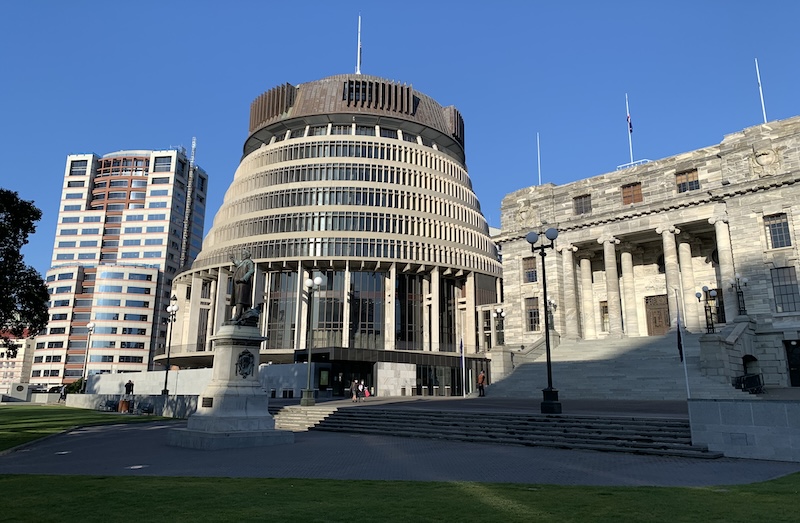Tories ‘just not good enough’ on cost of living crisis, says Starmer
The Tory leadership contenders have not produced any “credible proposals” to tackle the energy crisis, Keir Starmer has said.
Asked by reporters for his opinion on proposals from Liz Truss and Rishi Sunak to tackle the rising cost of living, the Labour leader said:
We haven’t seen any credible proposals from the candidates involved in the leadership race.
Starmer claimed they had instead “engaged in an internal battle”, adding:
Their main argument seems to be that their record in government has been so awful that you ought to vote for one or other of them. It’s very unusual for a government to be trashing its own record whilst it is still in government.
He also said:
On the cost-of-living crisis they’re not saying anything meaningful. We put out a fully-costed, comprehensive plan and that answers the question: what are you going to do for households this autumn when those prices go up?
We haven’t seen anything from the candidates that matches that. Meanwhile, you’ve got Boris Johnson who insisted that he stay in post. We were saying: ‘You should go once you resign.’ He said: ‘No, It’s important to stay in post’.
He last week acknowledged there’s a real problem with energy prices going up and then said almost in the same breath: ‘But I’m not going to do anything about it, that’s for somebody else in the future.’ It’s just not good enough.
Key events
Filters BETA
Keir Starmer insisted Labour has been considering how to address soaring energy bills for months.
Asked by reporters in Exeter whether his party had left it too late to come up with an energy plan, the Labour leader said:
We started talking about energy prices last September, nearly a year ago, that’s when I said we’ve got to do something and set out what we would do to insulate homes.
So that was a year ago. In January I then said there should be a windfall tax and the government said no and then five months later finally caught up with us.
We also said VAT should be taken off energy bills in January this year and Rishi Sunak is just beginning to say that Labour got that one right as well and now he’s laid out a fully-costed plan.
Keir Starmer said it was “right” that Labour’s energy plan provides help “across the board” as this would keep down inflation.
The Labour leader told reporters during a visit to Exeter:
Many, many households are now finding it hard to pay their bills so it’s right that it’s across the board.
There does need to be targeted help to those most in need. The pre-payment metres are a complete scandal because they’re being asked to pay even more, so we’ve got an answer to that question.
But there’s an advantage in it being across the board because energy prices are a huge driver of inflation and our plan not only keeps the prices down this winter, but it also takes inflation down by 4% which is an essential measure.
So we are answering the question: ‘What will you do for many households who can’t pay their bills this winter’. And we are saying we won’t allow those prices. But we’re also answering the question: ‘What will you do about inflation?’.
We’re saying this measure will bring inflation down by 4%.
The government is engaged in a “constant pattern” of adopting Labour policies months after rubbishing them, Starmer has suggested.
Asked if he thought the government would “pinch” Labour’s proposals to deal with the rising cost of living once a new prime minister is selected, Starmer told reporters:
What I want to see is action on this that is going to help people in the course of this winter.
When we first came up with the windfall tax idea in January of last year, the government said: ‘No, we’d never do that, it’s wrong in principle.’
For five months they let families struggle and households struggle, then they u-turned and adopted our position. On reducing VAT or eliminating VAT on fuel bills, again, we said that last January. Rishi Sunak then rubbished it until about a week or so ago when he stopped and said: ‘Oh, I do think that’s the right idea’.
So if you look at this, there’s a constant pattern which is Labour putting the practical solutions on the table, the government saying no, they’re not the right ones, and then months later adopting them.
Tories ‘just not good enough’ on cost of living crisis, says Starmer
The Tory leadership contenders have not produced any “credible proposals” to tackle the energy crisis, Keir Starmer has said.
Asked by reporters for his opinion on proposals from Liz Truss and Rishi Sunak to tackle the rising cost of living, the Labour leader said:
We haven’t seen any credible proposals from the candidates involved in the leadership race.
Starmer claimed they had instead “engaged in an internal battle”, adding:
Their main argument seems to be that their record in government has been so awful that you ought to vote for one or other of them. It’s very unusual for a government to be trashing its own record whilst it is still in government.
He also said:
On the cost-of-living crisis they’re not saying anything meaningful. We put out a fully-costed, comprehensive plan and that answers the question: what are you going to do for households this autumn when those prices go up?
We haven’t seen anything from the candidates that matches that. Meanwhile, you’ve got Boris Johnson who insisted that he stay in post. We were saying: ‘You should go once you resign.’ He said: ‘No, It’s important to stay in post’.
He last week acknowledged there’s a real problem with energy prices going up and then said almost in the same breath: ‘But I’m not going to do anything about it, that’s for somebody else in the future.’ It’s just not good enough.
Labour cost of living plan focused on households not businesses for now, says Starmer
Labour’s plans to reduce the costs of rising energy are “primarily aimed” at households for now, rather than businesses, the opposition leader, Keir Starmer, said.
Asked by reporters in Exeter if Labour would provide more help to businesses with energy costs, the Labour leader said:
Well, this is obviously focused on households because the average bills once the price cap changes is going to go from just under £2,000 to £3,500 in October, and then up again to £4,200 in January, but lots and lots of households are just not going to be able to pay. So this answers that question.
Businesses, of course, are impacted as well and where there’s high energy intensity businesses we’ve said there should be up to a billion pounds available to them, and for small businesses we want to change the threshold for rates so that they are impacted less by these prices.
But this is a package primarily aimed at those households who are going to struggling to pay their bills during this winter. It was bad enough last winter going to be unbearable for many of them this winter.
Keir Starmer said people have welcomed Labour’s “radical” energy plan.
The Labour leader told reporters during a visit to Exeter:
We’ve been talking to people this morning about how they’re going to cope through the winter and they are very, very pleased to hear an announcement that says: we’re not going to let those prices go up, so this is across the board, it’s a radical plan.
The fear is that if the government doesn’t step up, the prices, the average will go up from £2,000 or so to £3,500, then up again to £4,200…
We’re saying we’ll hold that back, we won’t allow those prices to go up and we’ll make sure that those that are actually making a lot of profit out of this pay for holding those prices down.
And that is the sort of plan that I think people are very, very receptive to.
The prime minister’s official spokesperson said the government expects action from water companies that are not seeking to reduce leaks as the country deals with drought following a long period of dry weather.
Asked whether drought was now a growing priority for the government, he said:
I think the Chancellor of the Duchy of Lancaster has talked about this before and said this is something we do need to be alive to.
Clearly these are not regular events, these sorts of long periods of dry weather or extreme heat. But because of climate change the possibility of seeing them has increased and so as a responsible government you need to adjust long-term planning to that end and that’s what we are doing.
Of water companies, the spokesman said:
Companies that are not taking action to address leaks or invest in infrastructure will see the government step in.
He added that the water services regulation authority Ofwat had set out a 51 billion five-year investment package.
We do know that water companies are investing significant sums into infrastructure. They’re investing £469 to investigate and develop options like new reservoirs, water recycling, water transfer schemes. So we have sufficient water resources across the country. But there should be no doubt that we would expect action for those companies that are not seeking to reduce leaks.
Starmer: Labour energy plan ‘real’ answer to soaring prices
Keir Starmer said Labour’s energy plan was a “real” answer to soaring living costs and the “opposite” of what the government was offering.
The Labour leader told reporters during a visit to Exeter:
This plan will take us through this winter and there are so many people who are anxious about what’s going to happen in the autumn, anxious that they can’t pay their bills.
So this is a real answer, a costed answer to them, it’s really the opposite of what you’ve got from the government who are saying absolutely nothing.
He added that other mid and long-term plans were needed such as insulating houses and a “sprint on renewables” such as solar, tidal and wind to make Britain less reliant on the international market.
Asked if Boris Johnson’s holiday could have waited a few weeks as the country faces a cost-of-living crisis, his official spokesperson said: “I can’t get into the decision around timings but he is on leave this week. He will be back this weekend.”
Pressed on whether two holidays abroad in two weeks fitted with the prime minister’s statement that he would continue business as usual in his final weeks in office, the official said:
You heard from the prime minister last week, government activity continues.
Over recent weeks we’ve made a number of significant announcements and will continue to do so in the coming days.
The spokesman said Johnson was paying for his own holiday but declined to say whether his security was funded by the taxpayer.
Boris Johnson has no official engagements this week as he is on leave but would be involved if any urgent decisions arise, Downing Street has said.
Asked whether the prime minister has any engagements this week, his official spokesperson said:
The prime minister is on holiday this week.
As is the way with prime ministers as you know by virtue of their role they’ll obviously be kept informed on any urgent issues and make decisions particularly those (related to) national security for example.
He added:
If there were urgent decisions that required the PM’s input he will of course be involved in that. But the deputy prime minister (Dominic Raab) is able to be deputised for meetings should they come up but as far as I’m aware there are no such meetings currently scheduled.

Fiona Harvey
Boris Johnson should intervene urgently to start insulating British homes and introduce fiscal policies to reduce bills, as further delay will mean more people face “extreme suffering” this winter as energy bills soar, a former government chief scientific adviser has warned.
David King said: “This could be the worst possible time for the leadership of this country to be simply sitting back. We’re waiting until what? We have an energy crisis right now and we need good leadership. We need alert leadership, leadership that is thinking about this – and that is missing.”
Johnson, who has vowed to take no major decisions in his remaining time in office, attended a meeting of energy companies last week that had no conclusive outcome, and is now on his second holiday since resigning last month.
King told the Guardian:
He is the prime minister. He wanted to stay on, so he must deliver as prime minister. There is no one else who can do that.
He called for higher taxes on energy companies, which he said were riding soaring energy prices since the Ukraine invasion for a bonanza, rather than investing or becoming more efficient. “They are taking bigger and bigger profits, as the prices are so high. That can only mean that they are tying their profits to the price, not the volume they are delivering,” he said.
Read the full story here:

Peter Walker
With no concrete policies from a caretaker UK government over how to tackle the energy price crisis, the vacuum has been filled with a raft of ideas from prime ministerial hopefuls, opposition parties and others. Here are the main proposals:
Liz Truss
The Conservative leadership frontrunner has focused her attention on tax cuts, pledging to reverse the recent increase in national insurance. The only specific help on energy bills she has proposed is to suspend green levies, which would save the average household about £150 a year. Truss has not ruled out further help, but has repeatedly stressed her preference for tax cuts, although these would disproportionately help higher earners, and do nothing for pensioners or those not in work.
Rishi Sunak
The former chancellor has in part pledged to stand by assistance he unveiled while still in government, and said last week that he would cut VAT on energy bills, at a cost of about £5bn a year, pledging a similar sum again on targeted help for poorer households.
Labour
Under a plan formally unveiled late on Sunday, the party would spend £29bn with a six-month scheme that would freeze energy prices at the current cap, before it goes up in October. This would assist all households, even richer ones, but Keir Starmer has argued it would bring certainty and help to curb inflation, thus helping people with other bills. It would be paid for in part by an expanded windfall tax on energy producers.
Read more here:
As Keir Starmer presents his plans for an energy price freeze, Momentum called on Labour to add the nationalisation of energy to its proposals.
The leftwing campaign organisation said it supported Labour’s energy freeze policy, which it says would save consumers on average £600 on their bills, and has called on the Tories to implement it urgently.
However, it argues that money would be best spent supporting millions of people already struggling to pay their bills, for whom this plan offers little.
It points out that the TUC estimates that nationalising energy would cost £2.85bn, while Labour’s policy would see £29bn spent subsidising energy companies. Polling shows 60% of voters support public ownership of energy,
Hilary Schan, Momentum co-chair, said:
Instead of proposing to shell out tens of billions of pounds subsidising energy companies, Labour should be arguing for public ownership, at a fraction of the price. It’s the common sense solution, backed by most voters, and the best way to keep soaring bills down.
This ideological commitment to privatisation is out of step with all electoral and policy logic. In keeping with his pledges, Starmer must back nationalisation of energy.

Jasper Jolly
UK chancellor Rishi Sunak told MPs in February that the government’s aim was to make up for half the cost of energy price increases to households.
In May, the government updated the support to be worth £24bn. The Institute for Fiscal Studies (IFS) lays out the “five main strands”:
£400 to all households labelled as an “energy discount” that will be subtracted from energy bills.
£150 for all households in council tax bands A-D (around 80% of households).
£650 for any family on means-tested benefits.
£300 for pensioners on means-tested benefits.
£150 for those on a disability benefit.
That meant that the government was covering about three-quarters of the £33bn increase in energy bills that was expected then, in May.
The problem is that costs have continued to surge since then, to the point that bills are expected to more than double from already elevated levels come the winter.
The consultancy Cornwall Insights forecasts that bills could rise to £4,266 in January and £4,426 in April before easing somewhat – but will remain elevated until we see a proper decline in wholesale prices. Given the cap is currently £1,971, it is easy to see how the price of keeping support at the same level starts to stack up.
Conservative former Northern Ireland secretary Brandon Lewis, who is supporting Liz Truss, branded Labour’s energy plan a “poor policy”.
He told Sky News:
I think it’s overarchingly a poor policy because it doesn’t resolve the issues of our economy, it potentially creates bigger inflation and debt problems in the future.
What we do need to do is help people have more money in their pockets to deal with the challenges, set out (a) structured way that we can help people, that’s what an emergency budget will do.



















Discussion about this post